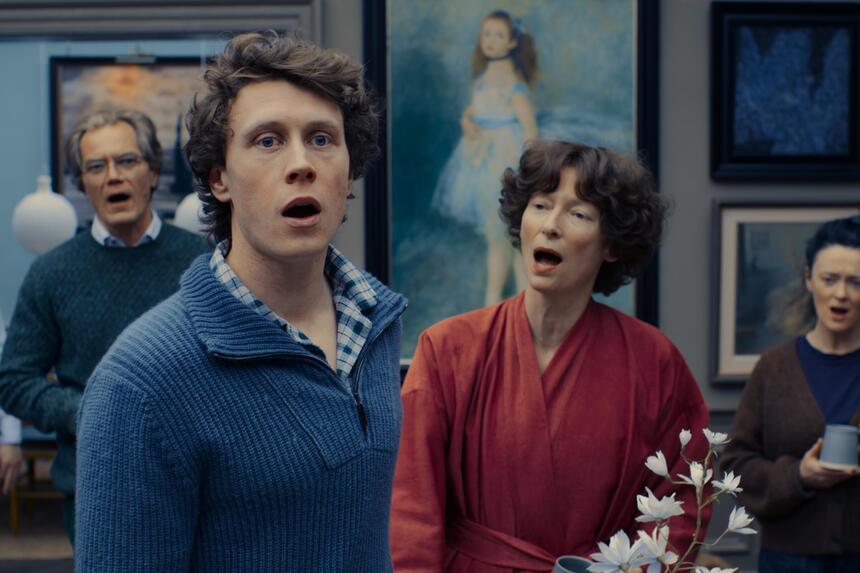THE END Review: A Song For the Discordant Last

Perhaps because we feel, more so than ever, at the edge of a possible fall of civilzation as we know it, the destruction of the environment to the point of unsustainability, but likely many of us have thought about (either in warped fantasy or serious planning) if we were one of the very very few who could have some bunker to escape to, somewhere that our basic needs could be met, more or less, as we waited to die.
But that would still be knowing that billions were left behind to die in slow proverbial, and literal, agony, and that our wealth came from the cause of that agony. Joshua Oppenheimer is most known for documentaries that look at some of the worst of humanity, as in The Act of Killing and The Look of Silence, makes his narrative feature debut with a rather ambitious apocalyptic musical. Not always hitting the mark and perhaps a little indulgent with its running time, it nonetheless explores some interesting ideas and features terrific performances that feel as real as the situation is odd (to say the least).
Father (Michael Shannon), a former executive who made his fortune in fossil fuels, created a somewhat vast space underground in which to live out his final days with his wife, Mother (Tilda Swinton), her best Friend (Bronagh Gallagher), his Butler (Tim McInnerny), and their Doctor (Lennie James). When they came underground, Mother was pregnant, so their Son (George MacKay) only knows about the outside world from what they have preserved, and what they tell them. The core family of three fill their days with various activities: swimming, writing a book about Father, building a model train set, changing the vast collection of artwork preserved for ... well, just for them. The others serve the family in exchange for their continued survival (though they seem content to do so).
It's clear that their sanity is barely holding together, though it's worse for some than others. And of course, something must happen to interrupt this presumed 'perfection'. Girl (Moses Ingram), one of the last remaining people still living on the surface, has somehow found her way into their lair. While at first they decide to send her outside again, some brief anger and a moment of compassion convinces them to let her stay. It's not surprising that, given she is around Son's age and the only new person he has ever met, he would begin to fall in love. And it's not surprising that she would start to crack the veneer of the world, and more importantly, his parents and the identity of themselves they have constructed, that Boy has held his entire life. His father, who is alive literally because he was a ruthless capitalist, would tell his son that those who died building the railroad did so happily; that his charity work far outweighed his deliberate and wanton destruction of the planet, that led to whatever disaster sent them underground.
For Mother, the lies she has told to keep her sanity means that everything must be at a level of perfection according to such exacting standards that even the least bit of discomfort, even which she does not have to experience, is not allowed. But that is the privilege of the rich: every eccentricity must be catered to, so long as it doesn't cross a line that only they get to decide on. Friend seems to have the strongest equilibrium to the situation, acting as second mother to Son even as she mourns her own child, while Butler and Doctor each play different with their position of power, or lack thereof.
The choice to make this a musical makes a strange sort of sense. The crushing weight of knowledge, of what the world has become and how these few have survived it and by what means, would make for something perhaps too bleak to be realized, both for the audience and the characters. The act of singing allows for some relief of pressure, for a means of expression that becomes a little poetic, that can have its hints of sadness and moments of joy in a more cinematic way. Set against this bizarre backdrop of giant human-made tunnels, the song and dance seems both completely out of place, and yet the only way these people could possibly cope with the discordance of their existence.
Production designer Jette Lehmann (Melancholia, Flame & Citron) and the art direction team do outstanding work to create this interior word: the tunnels perhaps a means to imitate estate grounds, except they are reminders of how artifical this world is, and how unwelcome the humans are. Even as they open their bedroom doors, they are confronted with it. No manner of Dutch landscape paintings or sleeping pills or fancy dress parties can hide the fact that these lives are artifically maintained to the point of almost being ridiculous to maintain.
It's the performances that are the heart of this film; the nature of their situation makes emotions necessary to hide, and yet it's impossible to hide, even in these caverns. Survivor's guilt is hitting them all to different degrees, and the weight of the dying world is literally hanging over them. Ingram, Swinton, and MacKay especially bring such a range to their performances, in large and small ways, that it's impossible not to sympathize and wonder if we might act the same way, under such strange and extreme conditions.
It does stretch a little too long at 2 1/2 hours, but it's trying to cover a lot of ground, to impart to the audience this weight of what seems an endless life of sameness that can never be maintained with complete sanity. While not always successful, Oppenheimer and his team, and especially his cast, create a fascinating though exercise, with song, that encourages self-examination on how we would behave if we survived at the end of the world.
The End is currently screening in cinemas in the USA, and will open in Canada on Friday, December 13th.








